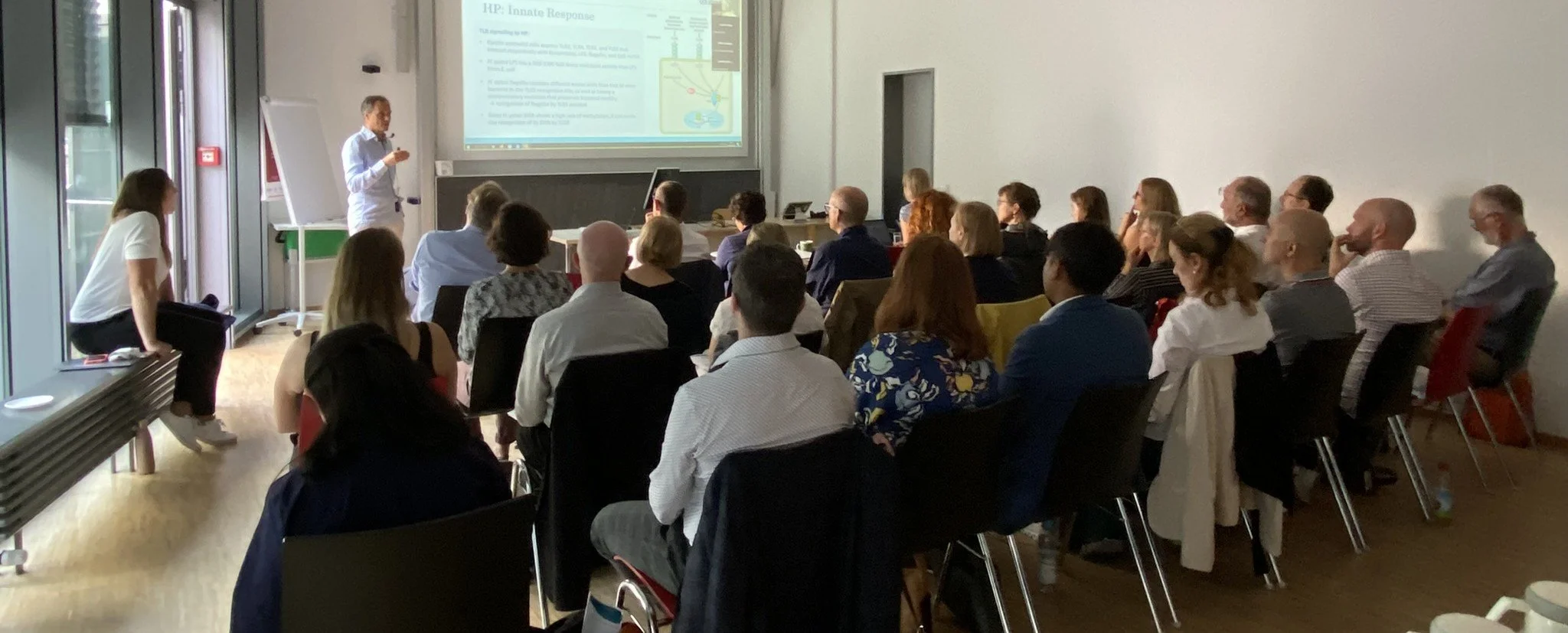“Vaccine development addresses the root cause of AMR”: Interview with Vax2Muc coordinator Prof Dr Markus Gerhard
Vax2Muc researchers are working to lower the burden of Heliobacter pylori (H. pylori), the most common bacterial infection and the leading cause of gastric cancer. Treatment of the infection includes antibiotics, but bacteria’s resistance to these drugs is growing. In the quest to find alternatives to the prevention and treatment of H. pylori, the consortium is focusing on vaccine development. Vax2Muc project coordinator, Prof Dr Markus Gerhard, explains why this type of research is important in the context of growing antibiotic resistance and how Vax2Muc fits into this bigger picture.
How does antimicrobial resistance affect the treatment of chronic bacterial infections such as Heliobacter pylori?
Antimicrobial resistance (AMR) significantly complicates the treatment of chronic bacterial infections like H. pylori. This bacterium is the most frequent bacterial infection worldwide and the primary cause of peptic ulcers and gastric cancer. Successful eradication typically requires combination antibiotic therapy. However, rising resistance to commonly used antibiotics, such as clarithromycin, metronidazole, and levofloxacin, leads to higher rates of treatment failure. This is particularly problematic since two different antibiotics must be applied for successful eradication.
Resistance reduces the effectiveness of standard treatment, which means that doctors must use alternative or combination therapies. In practice, this means that treatment plans must, whenever possible, be personalised. Tests are performed before treatment to determine whether the bacteria are susceptible or resistant to specific antibiotics, and the results influence the treatment regime doctors prescribe. Additionally, antibiotic resistance drives the need for repeated treatments, further contributing to resistance development. Therefore, growing antimicrobial resistance results in more complex, costly therapies and is associated with greater side effects.
To respond to this situation, we need more robust surveillance of bacterial infections while following evidence-based guidelines in prescribing antimicrobials and supporting innovative research to develop new treatment strategies or vaccines.
What do these steps mean concretely? How are scientists tackling AMR in the context of bacterial infections such as H. pylori?
Scientists are employing a multifaceted approach to tackle antimicrobial resistance in infections like H. pylori. Some methods consider how infections are monitored and treated, while others are more focused on developing alternative treatments.
Firstly, we need to make sure that treatment strategies follow the latest information about antibiotic resistance patterns. Developing regional and global surveillance systems supports this goal. Based on up-to-date information about antibiotic resistance, doctors can make better-informed decisions about which antibiotics to use and when, preventing overuse and misuse, limiting the growth of antimicrobial resistance. We can also adapt the treatment to individual patients by first testing the antimicrobial resistance of the specific strain of infection they have. This approach is especially recommended in areas of high resistance.
When it comes to the development of alternative treatments, there is a range of ongoing scientific research. First, some early-stage research aims to develop new antibiotics that are effective against resistant H. pylori strains. Then, moving away from antibiotics, we have the development of alternative, non-antibiotic treatments, which include probiotics, antimicrobial peptides, and natural compounds. And finally, we have ongoing research to develop vaccines that would prevent H. pylori infection. This research area aims to reduce the need for antibiotic treatment and curb the growth in resistance.
Why is vaccine development a good approach to tackling AMR?
Vaccines can prevent bacterial infections from occurring in the first place. And when there are fewer incidences of infections such as H. pylori, antibiotics are prescribed less, diminishing the pressure on bacteria to evolve resistance mechanisms. This decreases the overall prevalence of resistant bacterial strains, helping to preserve the effectiveness of existing antibiotics.
Vaccines are also a more sustainable solution to infection prevention and control. Unlike antibiotics, which can become ineffective over time due to resistance, vaccines often provide long-lasting immunity.
Finally, vaccines also bring broader healthcare and societal benefits. Vaccines reduce the burden on healthcare systems by preventing infections, including costs associated with treating drug-resistant infections. Additionally, vaccines not only protect individuals but also contribute to herd immunity, reducing the spread of infections in communities and lowering the risk of outbreaks of resistant bacteria.
Overall, vaccine development addresses the root cause of AMR: the overuse and misuse of antibiotics.
The rise in antimicrobial resistance requires innovative strategies to prevent and treat bacterial infections. How does Vax2Muc contribute to the battle against AMR?
Vax2Muc is developing next-generation vaccines targeting gastrointestinal (GI) mucosal pathogens, with H. pylori as a model organism. To combat such infections, immunity must be achieved in the mucosal tissues. The stomach and intestinal linings are primary entry points and habitats for gastrointestinal pathogens, but also the source of many AMR organisms. Traditional vaccines administered systemically often fail to generate strong immune responses at these mucosal sites. Vax2Muc aims to develop vaccines that specifically boost mucosal immunity, ensuring a more effective and localised defence mechanism against pathogens residing in the gastrointestinal tract.
By focusing on mucosal immunity, we aim to develop a cost-effective and innovative way to tackle infections that are otherwise difficult to treat due to rising resistance levels.


